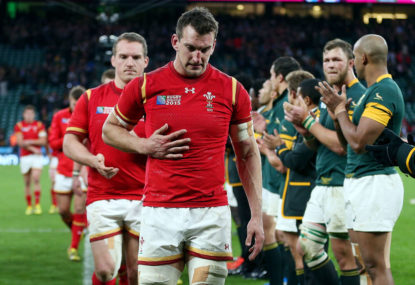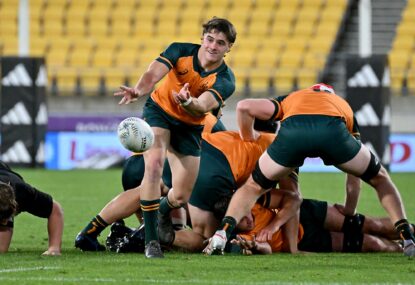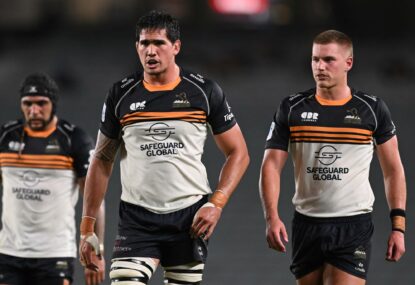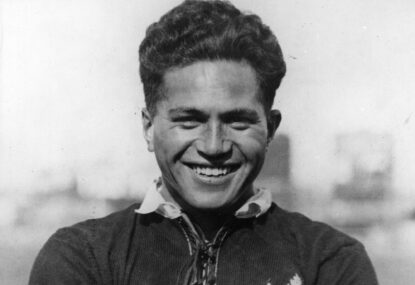Watching the Jaguares throw the ball around with such reckless abandon – scoring some great tries and conceding two to interceptions along the way – I was left to wonder why France and Wales could not replicate such an exhilarating display.
There are some obvious reasons.
The pressure not to lose in the Six Nations to such close neighbours, who all share such inter-woven and emotive histories, is intense.
The fans and media feel it so much that this pressure can sometimes suffocate the players and their coaches. But that’s why we love it.
So that aspect of the game cannot be blamed for a mediocre evening of rugby that took place in the brilliant atmosphere of Cardiff.
Other observers have suggested that the February weather isn’t always conducive to sharp hands and fast running. This is probably a factor when it’s raining, but it wasn’t raining in Cardiff so it has to be ignored as an excuse.
Another comparison between the two games was the size of the pitches. From the purely subjective perspective of a TV camera, it looked like the Toyota Park in Bloemfontein was a good couple of metres wider than the Millennium Stadium.
Then again, that’s without taking into account the width of the Welsh players who look to have taken gym training rather to heart since the arrival of Warren Gatland.
In the end, the actual reason the Argentinian side were so much more exciting to watch than either France or Wales, came down to ambition and execution in attack.
To combat defensive teams slowing the ball down at the breakdown, the Jaguares have negated the breakdown totally with an ambitious off-load game that looks almost preternatural at times. And for the two interceptions, hopelessly naïve.
Simply put, the Jaguares’ gameplan was to break the advantage line with a variety of strong ball carriers, unexpected running lines, speed and dancing feet, then recklessly throw the off-load and trust a man in orange would be there to reap the rewards.
France tried a similarly ambitious gameplan, just without the organisation, ball carriers or running lines. Some might say this approach was foolhardy, others might call it stupid, especially considering the standard of the defence they were playing against.
Nonetheless, France do possess some players capable of playing this type of game. In Maxime Machenaud they have a scrumhalf who is electric in his delivery. Jonathan Danty has consistently demonstrated in the Top 14 how to hold a defender and release the runner.
Maxime Medard can dance through a gap no bigger than a penny, much like a Frenchman from the Eighties. And Virimi Vakatawa and Djibril Camara can both be devastating finishers.
However, at the moment, they are missing the straightness a few heavy runners would add to their attacking lines; runners who can make those hard yards in the middle of the park, commit defenders and cross the gain line.
Damien Chouly was pushed backwards today and reliable yard-markers such as Louis Picamoles and Mathieu Bastareaud are both missing from the matchday 23 for different reasons.
Therefore, when France looked to off-load it was always behind the gain line, meaning any inventive running lines were nullified and the man taking the off-load then found himself running into at least one or usually two Welsh defenders.
This resulted in the ball travelling even further behind the gain line and we all know forwards hate running backwards, which might explain why later in the second half, for over 10 minutes, they so resolutely refused to trust Jules Plisson with the excellent field position they’d worked so hard to achieve.
Added to this was the execution of their passes. In the first 10 minutes of the game, France threw a pass into touch, lobbed another one forward and just for good measure kicked a free-kick out on the full.
That last one doesn’t relate to a passing game but it is representative of the generally poor execution of basic skills under minimum pressure demonstrated by French players throughout the game.
Another symptom of this wider French malaise was the amount of passes that bounced off blue chests before being collected. This indicates that either the pass wasn’t meant for that receiver, further indicating a lack of organisation and structure to their play, or the passer is over-compensating for something else lacking in their life.
Ultimately this is why that African pitch looked so spacious and exciting. When the Jaguares had committed defenders and broken the gain line their passes went to hand, not always to an Argentinian hand but c’est la vie.
Now, as my little brother pondered after the final whistle – were France making Wales look good or were Wales making France look terrible?
As a team, Wales remind me a little of the tough-as-a-nut 2003 England side but crucially lacking a Jason Robinson-type wizard on the wing. If Shane Williams was still playing, then this Welsh team might have a cutting edge to complement the hammer they currently exclusively wield in midfield.
What they do have, though, is a coherent and savagely organised defence, which utilises a different weapon each game to disrupt opposition attacking ball.
Against France, they targeted the ball-carrying arm of the attacker and tried to rip possession free. This makes sense; they have Sam Warburton and Gethin Jenkins to jackal at the breakdown and they have some very strong men to gang tackle and rip in the contact, doubling the opportunities for a turnover.
This ploy meant that France couldn’t look for the off-load as much as they wanted to because they were too busy trying to hold onto the ball. I lost count of the amount of knock-ons that were incorrectly called through this ripping tactic.
Therefore, Wales without the ball look like they have a plan, which involves working through the phases and forcing the mistake that will gift them a try. So far it has been their most effective attacking weapon. However, it is when they have the ball that they seem to struggle.
If the Welsh defensive plan is a multi-faceted ever evolving organism, then the attacking plan is a one-cell amoeba.
Beyond flinging the ball to Dan Biggar so he can kamikaze-chase one of his high kicks, there has been precious little creativity evident in the backline and, ironically, they don’t seem to possess any attacking weapons beyond what France are missing – heavy runners.
George North, Jamie Roberts, Jonathan Davies and Alex Cuthbert are all blunt instruments, asked to perform identical tasks in attack.
To be fair, Davies did try to introduce a more nuanced kicking game with neat chips over the on-rushing defence but through doing this, both he and Biggar blew three overlaps in the first half. Simple hands would have gained greater yardage, maintained possession of the ball and maybe even created a try.
In the 66th minute, commentator Brian Moore pleaded with Wales to cut loose and he was only echoing the cries of every neutral rugby fan from the first weekend of the Six Nations to that moment. But Wales currently do not possess the mentality to cut loose. Whether this stems from the coaches or the individual players is anyone’s guess.
So, in answer to my brother’s question, I would suggest it was France who were made to look awful trying to play a game that was beyond their capability against a team that preys on that type of unrealistic ambition.
However, France, as a team, have bundles of potential. But when haven’t they in the past 10 years? What they lack is a coherent structure and a gameplan that isn’t suicide.
Wales, on the other hand, will continue to play to their strengths, but their greatest weakness remains – they are not a team that can go out and win a game but rather one that waits for the other side to lose it.




































































































